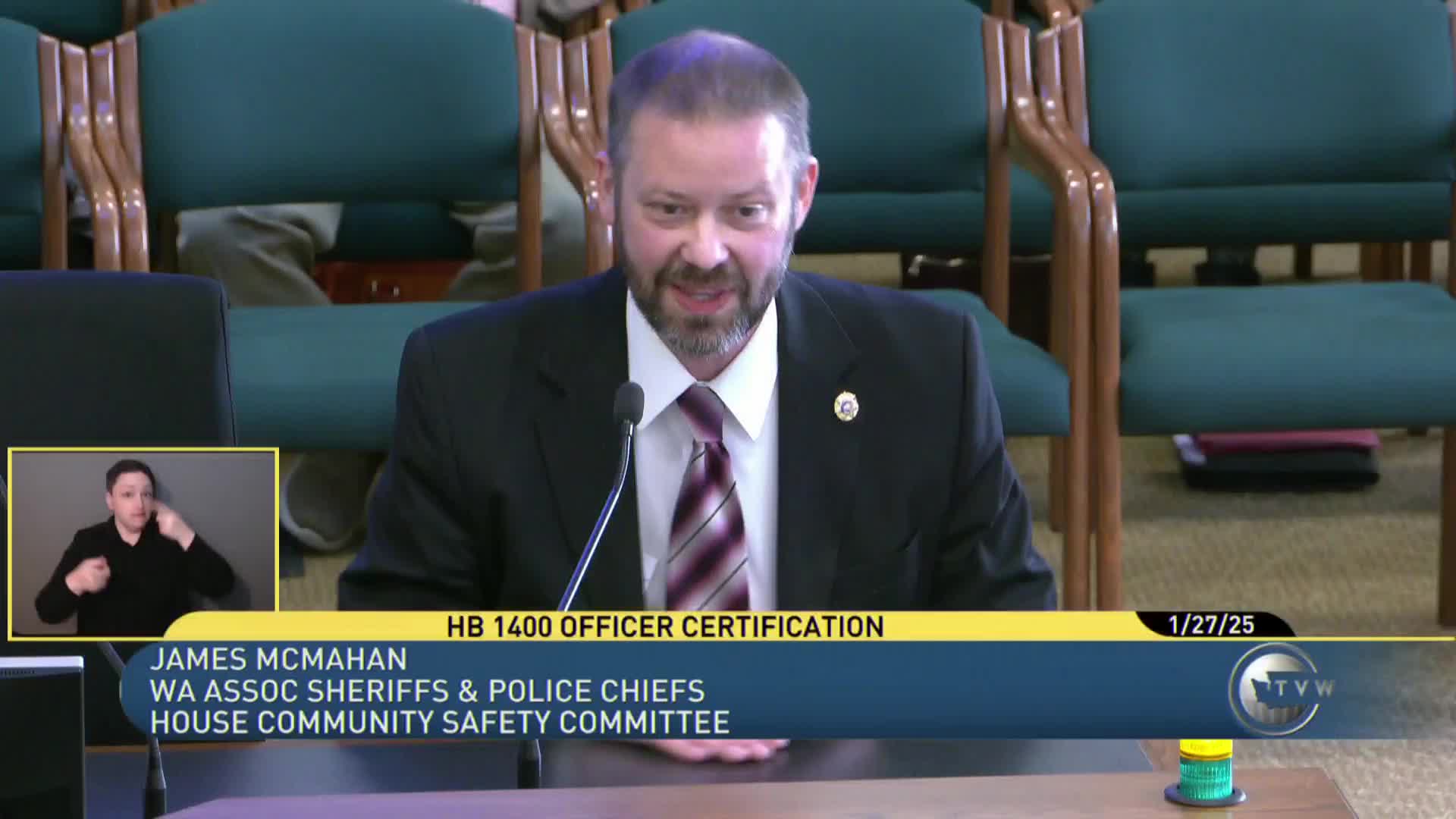Broad bill to tighten standards for sheriffs, chiefs and volunteers draws robust debate
Get AI-powered insights, summaries, and transcripts
Subscribe
Summary
Chair Goodman opened an extended public hearing on House Bill 1399, a comprehensive proposal to modernize eligibility, background‑investigation and certification requirements for sheriffs, police chiefs and marshals and to limit law‑enforcement authority for volunteers unless certified.
Chair Goodman opened an extended public hearing on House Bill 1399, a comprehensive proposal to modernize eligibility, background‑investigation, certification and duties for sheriffs, police chiefs and marshals and to restrict law‑enforcement authority for volunteers and specially commissioned officers.
Major elements of the bill: HB 1399 would (1) set uniform eligibility criteria for police chiefs and marshals across jurisdictions, (2) require candidates for sheriff to submit background‑investigation requests to Washington State Patrol before filing and require CJTC verification, (3) require sheriffs to obtain CJTC certification within 12 months of assuming office, (4) limit volunteers and specially commissioned officers to roles that do not involve use of law‑enforcement authority or firearms unless those individuals are certified, (5) require CJTC to adopt by rule criteria for applicant suitability and publish summary records of certification actions, and (6) repeal obsolete statutory language about police matrons.
Supporters’ testimony: Dozens of organizations and community representatives spoke in favor. Malu Chavez, executive director of the Northwest Immigrant Rights Project, said uniform professionalism would “help build trust with immigrant communities” and make clear obligations to enforce state law and constitutional protections. The League of Women Voters, Planned Parenthood Alliance Advocates, the Alliance for Gun Responsibility, the National Police Accountability Project, Faith Action Network and several survivors’ and accountability organizations supported the bill as a way to modernize standards, increase transparency and protect vulnerable populations. Lyle Kwasim and Eliana Machevsky praised restrictions on armed, unvetted volunteers and called the proposal “good government.” Jeff Devere of the Washington Council of Police and Sheriffs supported certification and decertification accountability but asked for higher minimum years of experience for chiefs and cautioned on recruitment impacts.
Opposition and constitutional concerns: The Association of Sheriffs and Police Chiefs (ASPC) and several county and former elected officials testified in opposition or with strong concerns. James McMahon (ASPC) urged removal of the volunteers/specially commissioned provisions into a separate bill and warned HB 1399 could be unconstitutional if it prevented candidates from appearing on the ballot or stripped an elected sheriff of office through administrative processes. Former prosecutor Don Brockett and others argued the bill could exceed the legislature’s authority under state constitutional provisions concerning elected offices. ASPC raised practical concerns about imposing statewide suitability rules on locally elected or appointed officials and the potential for state agencies (WSP, CJTC) to effectively block candidates or remove elected sheriffs following decertification.
Community examples and narrow issues: Several witnesses from rural counties described local practices involving volunteers and hound‑hunter posses used in wildlife incidents; witnesses urged clarity so routine volunteer tasks (traffic control, parking enforcement) are not unintentionally restricted while armed posse activity that enables lethal force or arrests should be limited to certified personnel. Multiple witnesses cited specific incidents in Klickitat/Clackitat counties where armed volunteers and sheriff decisions raised public‑safety and liability concerns; Mountain Lion Foundation and Friends of the White Salmon River urged the bill be amended to address wildlife‑management actions by untrained volunteers.
Committee response and next steps: Chair Goodman said the committee had consulted more than 60 stakeholders in the interim and plans to convene additional stakeholder discussions on the volunteers/specially commissioned language, constitutional questions about elected sheriffs and the process for decertification and vacancy creation. The committee closed the public hearing after extensive testimony and signaled that the bill will receive further stakeholder work and legal review before any action.
